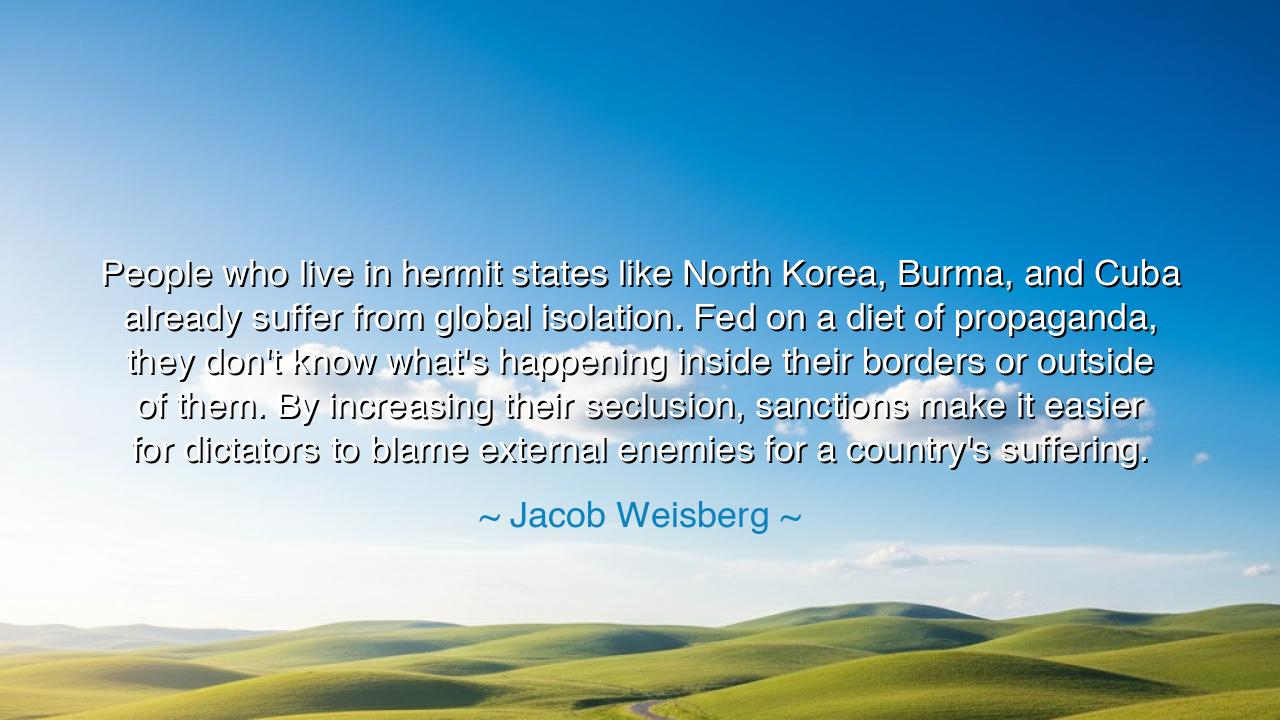
People who live in hermit states like North Korea, Burma, and
People who live in hermit states like North Korea, Burma, and Cuba already suffer from global isolation. Fed on a diet of propaganda, they don't know what's happening inside their borders or outside of them. By increasing their seclusion, sanctions make it easier for dictators to blame external enemies for a country's suffering.






In the words of Jacob Weisberg, “People who live in hermit states like North Korea, Burma, and Cuba already suffer from global isolation. Fed on a diet of propaganda, they don't know what's happening inside their borders or outside of them. By increasing their seclusion, sanctions make it easier for dictators to blame external enemies for a country's suffering.” These words, though steeped in the language of politics, reach far beyond governments and policies — they speak to the nature of isolation, the poison of ignorance, and the tragedy of power unchallenged. Weisberg’s insight reminds us that darkness does not only come from cruelty, but from confinement — from the deliberate cutting off of truth, dialogue, and understanding between people.
In every age, the tyrant’s first act has been the building of walls — not merely of stone, but of fear and ignorance. The people within these walls become like those living in a cave, seeing only the shadows cast by their rulers, mistaking illusion for truth. Propaganda, as Weisberg calls it, is the diet of such a people — nourishing not their wisdom, but their obedience. And when sanctions are laid upon such lands, when the outer world tightens its fist in anger or punishment, the walls grow higher still. The people, already trapped in silence, are told by their masters, “See how the world hates us. See how only I protect you.” And so oppression strengthens itself through isolation, feeding upon the very measures meant to weaken it.
This pattern is ancient. Recall the story of the empire of Qin Shi Huang, the first emperor of a unified China. In his quest to control thought, he burned the books of philosophy, silenced the scholars, and sealed his empire from foreign influence. He believed that by shutting out dissent, he would secure eternal peace. But isolation breeds stagnation, and silence breeds decay. When truth is exiled, lies grow fat. His dynasty, though mighty, lasted only a generation — for the spirit of a people cannot thrive in captivity. What Weisberg warns of in our modern time is the same truth the ancients learned through ruin: when nations turn inward, whether by tyranny or by punishment, they begin to rot from within.
North Korea, Burma, Cuba — these are not merely names of countries, but mirrors showing us what becomes of humanity when connection dies. Their citizens live in a world where the sun of truth never rises, where their only light comes from the flickering flame of state control. They are told that suffering is the fault of foreign devils, that poverty is caused not by greed or tyranny, but by external enemies. This is the great deceit of isolation — it turns victims into believers and tyrants into saviors. Thus, Weisberg’s words ring with sorrow and wisdom: if we close off such nations further, we do not starve the tyrant; we feed his myth.
But this truth extends even beyond politics. Every individual, too, may become a “hermit state” — isolated by pride, by fear, or by anger. When a person surrounds themselves only with those who agree, when they cut off voices that challenge or awaken them, they too are fed a diet of propaganda — the propaganda of self-deception. They become their own dictator, blaming others for every sorrow, blind to the truth within and around them. The lesson of the nations is the lesson of the soul: seclusion without reflection leads to delusion. To live in truth, one must remain connected — to dialogue, to difference, to humanity.
The great teacher Nelson Mandela understood this well. Imprisoned for decades on Robben Island, he was isolated by his captors but never cut off in spirit. He sought connection even with his jailers, learning their language, speaking to their humanity. In doing so, he broke through the walls that tyranny had built. When freedom finally came, it was not vengeance he carried in his heart, but understanding. Mandela’s example teaches what Weisberg implies: the cure for division is not deeper separation, but the deliberate building of bridges — even when others seek to destroy them.
Let this, then, be the teaching handed down: isolation is the weapon of the oppressor, and connection is the armor of the free. To punish nations, or people, by cutting them off entirely is to give power to their captors. The better path is to pierce the walls with light — with communication, with knowledge, with compassion. For even the smallest truth that enters a closed mind becomes a seed of change.
So, my child of tomorrow, remember this: whenever you see a wall, whether in the world or in the heart, do not strengthen it with silence. Seek to connect, to understand, to illuminate. For only through the exchange of truth can lies be undone. Weisberg’s wisdom is eternal: the more we isolate, the more we empower darkness — but when we open the gates of understanding, even the deepest night begins to yield to dawn.






AAdministratorAdministrator
Welcome, honored guests. Please leave a comment, we will respond soon